Choosing the right web hosting is crucial for your online store. This aspect of your digital presence influences everything from how quickly your pages load to the security of your customers’ information.
But with so many options out there, how do you identify the best ecommerce hosting solution for your needs? We’re here to help.
In this post, we compare 10 ecommerce web hosting providers, examining their features, performance, and pricing. This will help you make an informed choice on which provider offers the best value and support for scaling your ecommerce business.



What is an ecommerce host?
An ecommerce host is a business that provides space on its server for your online store to operate.
This company keeps all the elements—text, images, and code—that create your website and make it accessible to online customers. It communicates with browsers to deliver this information to anyone visiting your ecommerce site.
→ Click Here to Launch Your Online Business with Shopify
Types of ecommerce web hosts
Ecommerce web hosts come in two forms:
SaaS-hosted providers
Software-as-a-service (SaaS) hosting comes with the website builder you use to create your ecommerce store. It’s an ideal choice for those with limited technical knowledge, as the platform takes care of the technical details like linking your site to its domain name.
It’s also a budget-friendly choice for small business owners. You receive ecommerce web hosting and crucial tools such as inventory tracking, payment processing, and sales systems, all for one monthly fee.
Self-hosting providers
If you’re looking to have more control over your website, self-hosting could be the answer. Self-hosting providers have different tiers based on the capacity and speed of your ecommerce site:
- Shared hosting. With this option, you get space on a shared server. It’s a good starting point if you’re just starting out and want to keep costs low. Just remember, your site speed could be affected if another site on the same server consumes more resources.
- Virtual private server (VPS). Begin here if you have the budget. A VPS assigns you a dedicated part of a server for more bandwidth and storage space. This setup gives you more control over your store’s performance and reduces the impact of other sites’ traffic on your speed.
- Dedicated server. Choose this option when you want the whole server to yourself. It’s ideal when your site attracts a lot of traffic and needs maximum performance. Having a dedicated server means your site won’t be affected by demands from other websites.
The main drawback of self-hosting is that costs can climb quickly. The more you need in terms of speed, support, and space, the more you’ll pay. And that’s on top of your usual ecommerce expenses.
10 best ecommerce web hosting providers
The best ecommerce web hosting is reliable, easy to use, and capable of matching your budget. With that in mind, here’s a look at the top ecommerce website hosting vendors and what they offer in terms of service.
1. Shopify
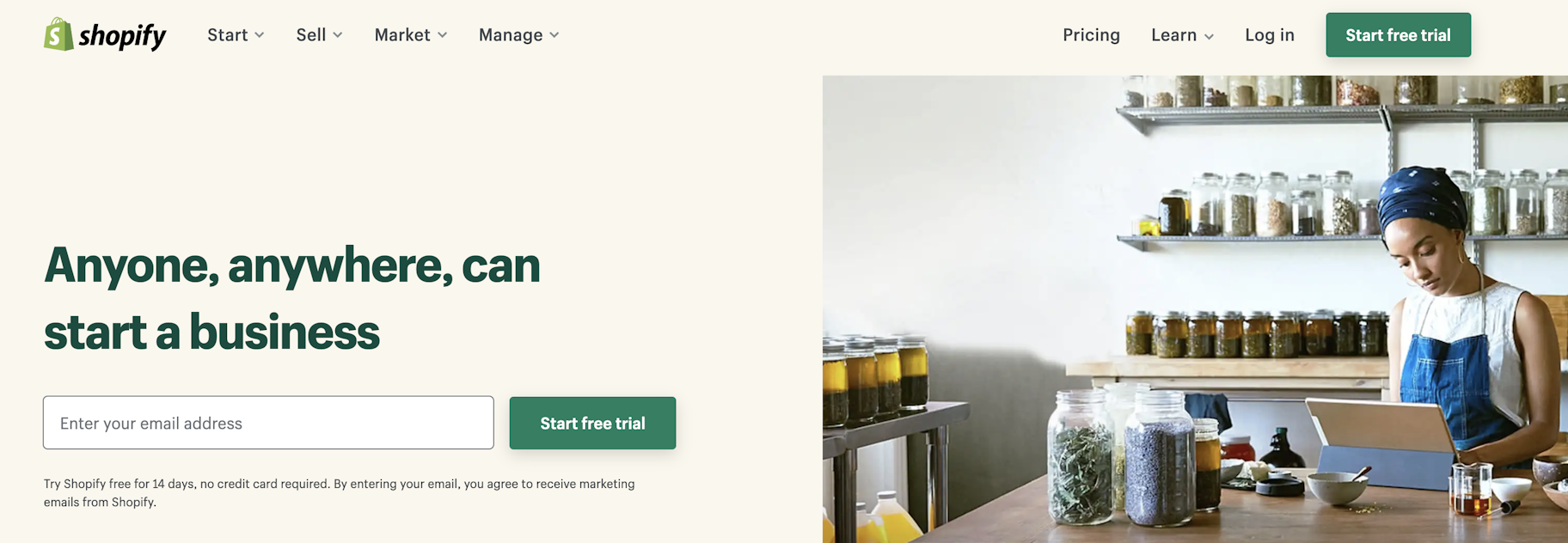
You’ve probably heard of Shopify, the ecommerce platform that makes it easy to build an online store. Did you know that most of its plans include ecommerce site hosting? Shopify users get hosting at no additional cost—it’s included in the price you pay to access the platform.
Shopify maintains 99.99% uptime and hosts its stores on blazing-fast servers, meaning your site and its content will load fast. It also uses a content delivery network (CDN) to ensure people worldwide can access your online store as quickly as possible.
Plus, Shopify offers many powerful and scalable features as part of its hosting services, including:
- Free domain name
- Unlimited bandwidth
- Free SSL certificates
- Unlimited email forwarding
- PCI compliance
So with Shopify, you can easily create and launch an ecommerce website without any worries.
Pricing: Starts from $39/month for an all-in-one ecommerce solution.
2. Bluehost
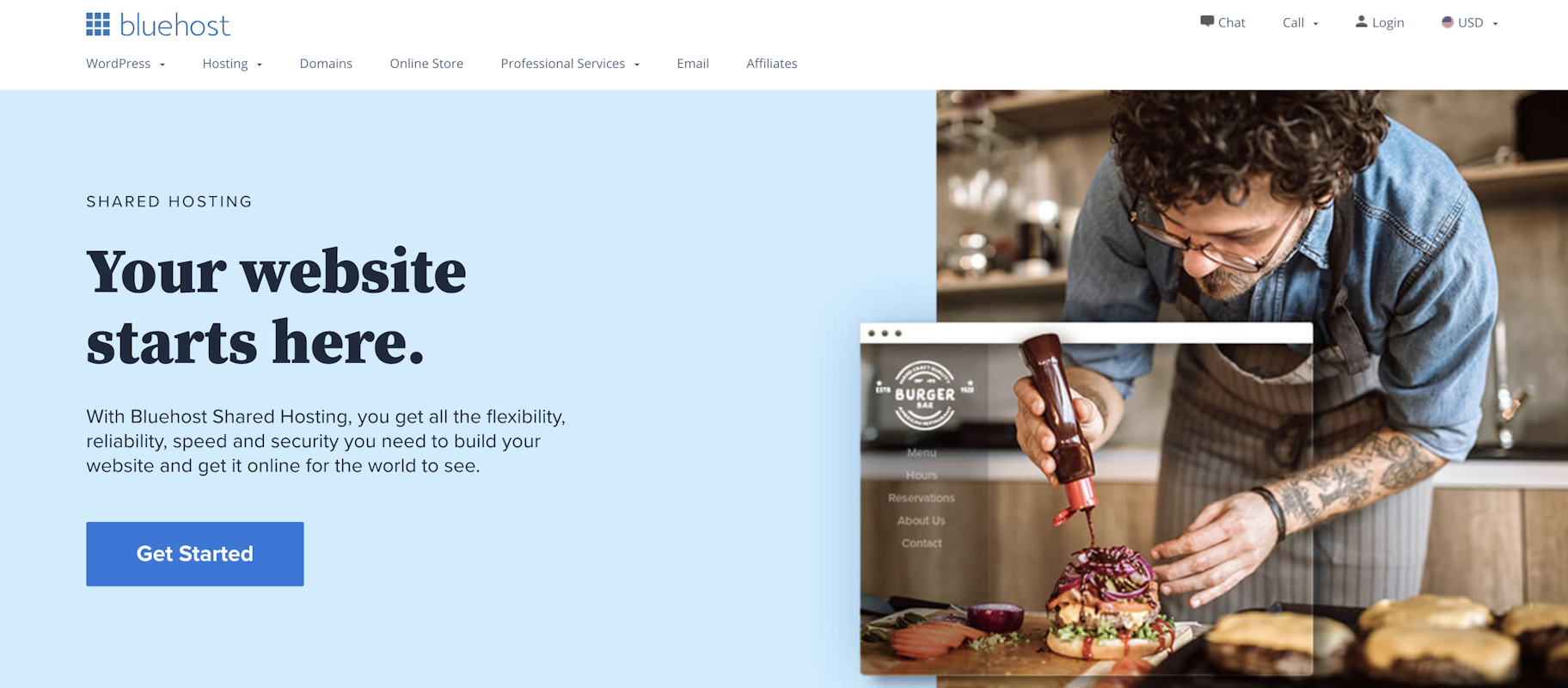
Bluehost offers hosting solutions suitable for ecommerce sites using WooCommerce or WordPress. You can find a plan that fits any budget, from basic shared hosting for startups to advanced VPS options for scaling businesses.
Bluehost’s mid-tier plans are extremely generous, featuring unlimited SSD storage, unlimited domains, and unmetered bandwidth, so your hosting can grow as fast as your store. Bluehost also supports a one-click setup through a dedicated WooCommerce plug-in if you have a WordPress website.
Each hosting package includes features essential for ecommerce, including:
- Automatic data backups
- Free CDN
- Custom themes
- 30 GB SSD storage
However, certain features are only available in premium packages, including unmetered bandwidth and domain name prices.
Pricing: Starts from $9.95/month.
3. IONOS
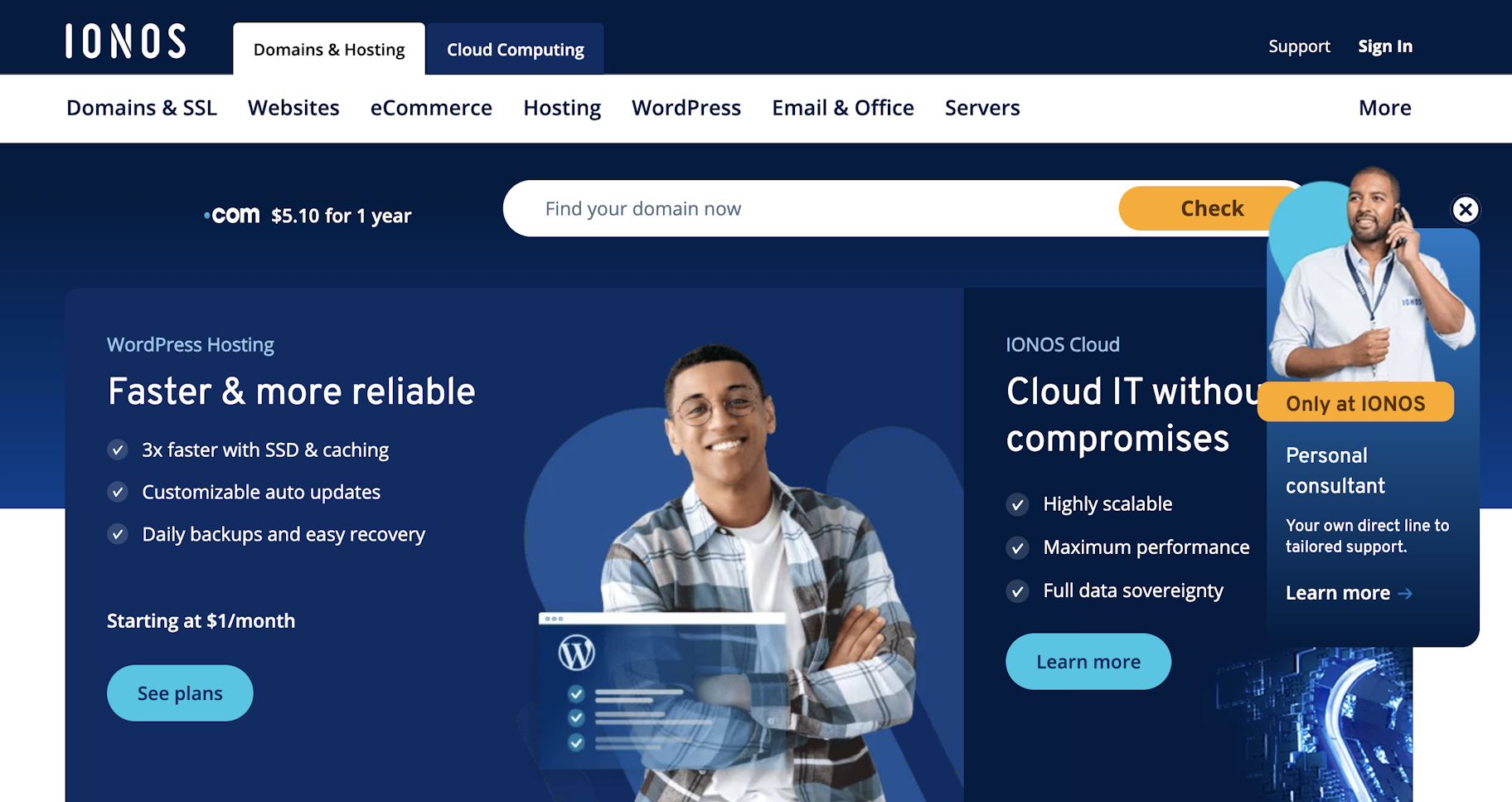
IONOS (formerly known as 1&1) offers different hosting packages for individuals, businesses, and organizations of all sizes. Those interested in hosting an online store can explore its Web Hosting Expert package, which includes features such as:
- 99% uptime (with two data centers)
- 500 GB storage
- Website analytics
- Enhanced CPU resources
- One-click install function for ecommerce platforms like Shopify
Fast loading speeds are one of IONOS’s most notable features. The ecommerce hosting provider reports faster loading times than most other web hosts, including GoDaddy, Hostgator, and Bluehost.
However, its control panel has a learning curve that may take some time and effort to navigate, especially for new users.
Pricing: Starts from $8/month for 12 months.
4. Hostinger

Popular with entrepreneurs on a budget, Hostinger is an affordable and feature-rich choice if you’re looking for the best web hosting for small business.
The optimized ecommerce environment on Hostinger ensures that companies can maintain fast, effective product pages. Another interesting feature is the access manager system, where you can collaborate with other team members on your online store.
All of the Hostinger’s plans are equipped with:
- Drag-and-drop builder
- Free email
- SSL certificate
- 24/7 Customer Support
Pricing: Starts from $9.99/month.
5. SiteGround
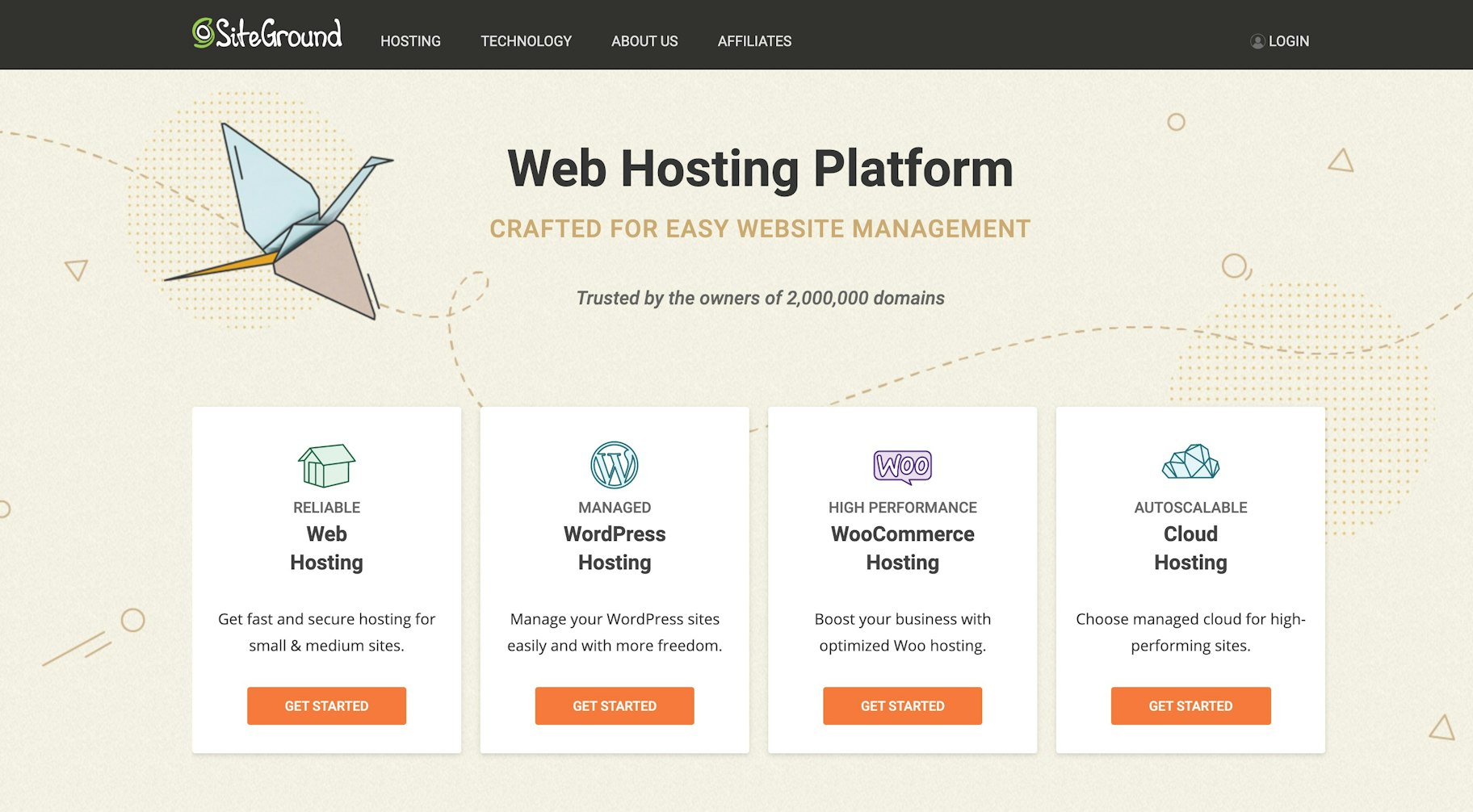
Siteground supports more than 2.8 million domains and has a 98% customer satisfaction rate. WordPress—the popular content management system—recommends its hosting for features like:
- Cloudflare protection
- WooCommerce hosting integration
- Constant security monitoring
- Free daily backups
- 24/7 customer support
However, it’s important to know that Siteground is no longer PCI compliant. This means for processing payments, you might need to integrate an external, compliant platform such as Shopify, which could lead to additional expenses.
Pricing: Starts from $4.99/month.
6. A2 Hosting
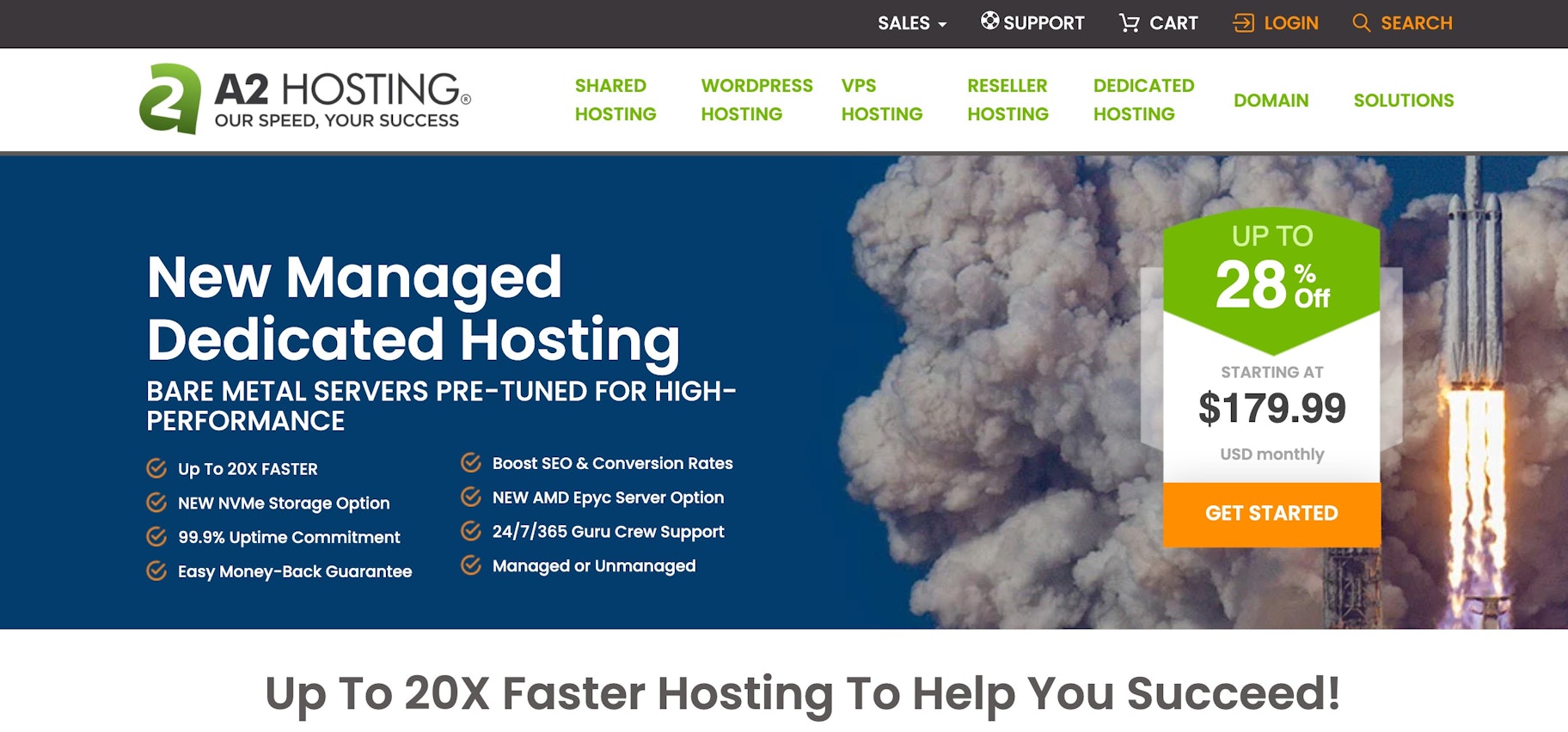
A2 Hosting provides various packages suitable for ecommerce site owners. Its shared ecommerce web hosting plans are well-suited for newcomers. As your website attracts more visitors, you might find the need to switch to its managed VPS hosting plan, which includes:
- 250 GB SSD storage
- A free SSL certificate
- A 99.9% uptime commitment
- Default fast loading speeds
- Support for PHP-based platforms such as Magento, Drupal, and Joomla
A unique aspect of A2 Hosting is its commitment to environmental sustainability. The company plants trees in Ann Arbor, Michigan, where it is based, every time a customer purchases a new package. If sustainability is important to your brand, A2 Hosting could be a good choice.
Pricing: Starts from $11.99/month for shared hosting.
7. Dreamhost

Dreamhost is a top-rated web hosting service that offers a 100% uptime guarantee. Its ecommerce hosting plans offer access to the WooCommerce plug-in.
You also get one-click staging, at least 30 GB of SSD storage, free WordPress migrations, and unlimited email as part of its packages.
Other key features of Dreamhost include:
- Custom control panel
- Domain-management tools
- Unlimited data transfers per month
- Strong security features
- 24/7 expert support
Pricing: Starts from $2.59/month for a shared starter plan.
8. GoDaddy
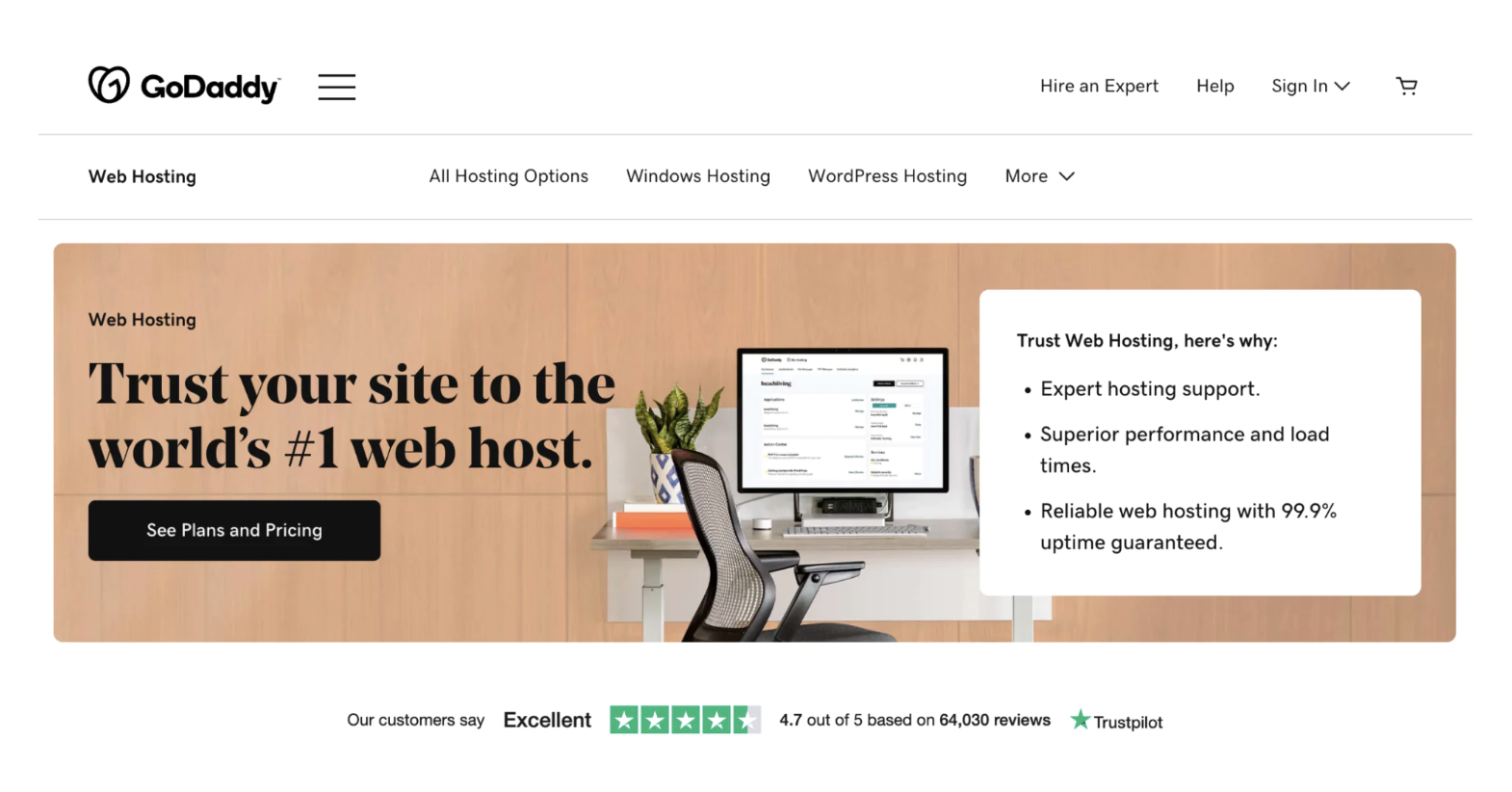
GoDaddy has a significant presence in the web hosting space, with a 10.4% stake in the market.
It offers four different hosting packages, depending on the storage, bandwidth, and processing power your online store needs. Each contains:
- Access to 150 free apps
- One-click WordPress installation
- Global data centers for fast site loading
- 24/7 security
Keep in mind that, as your ecommerce business grows, you’ll need to switch your GoDaddy hosting plan to match your scale. To gain faster processing power and speed, along with 100 GB of storage and free SSL certificates for security, you’ll have to upgrade to either the Ultimate or Maximum plan.
Pricing: Starts from $9.99/month for the economy plan.
9. InMotion Hosting
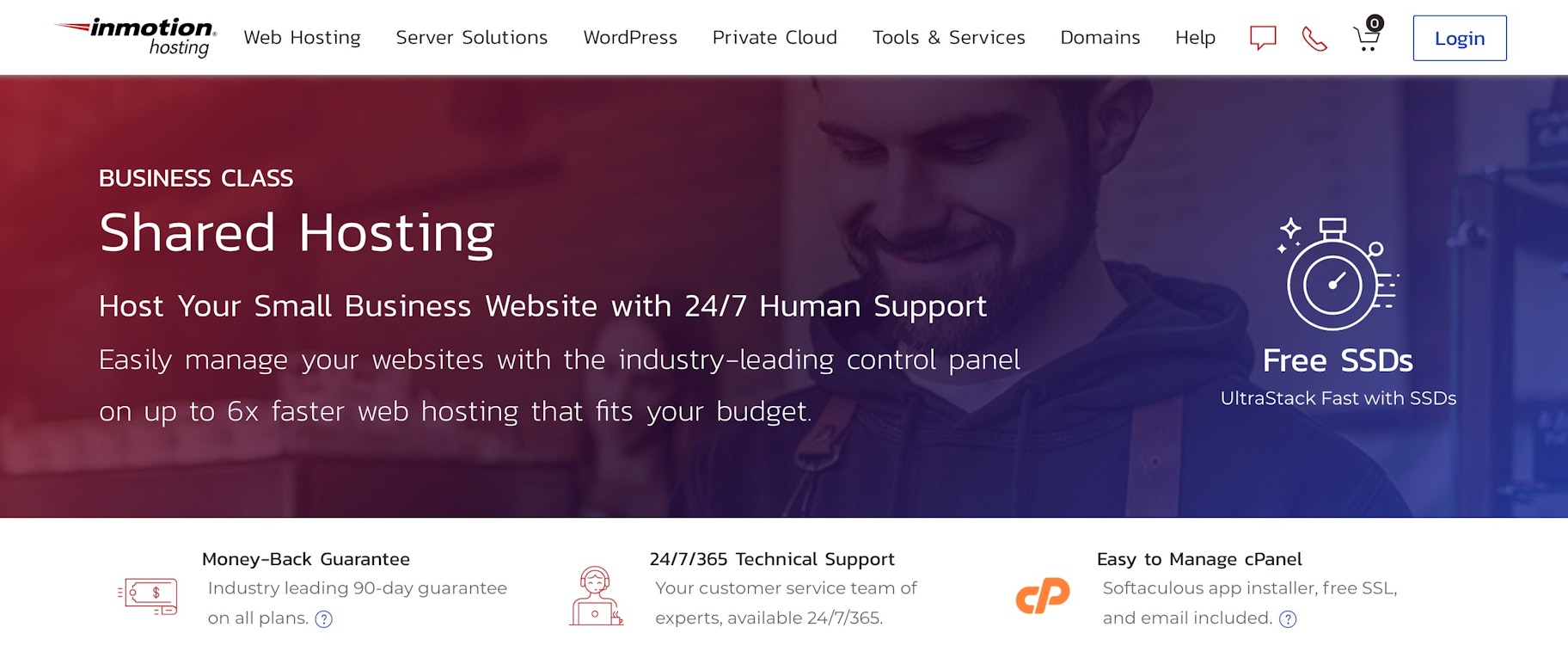
InMotion Hosting suits businesses of all sizes aiming to set up an ecommerce store.
It provides different website hosting plans that are easy to set up and backed by dependable customer support. However, the basic plans come with storage limits.
Key features include:
- Optimization for PrestaShop, Magento, OpenCart, and WooCommerce
- Free SSL certificate
- Advanced caching
- Round-the-clock support
Pricing: Starts from $2.49/month.
10. Hostgator
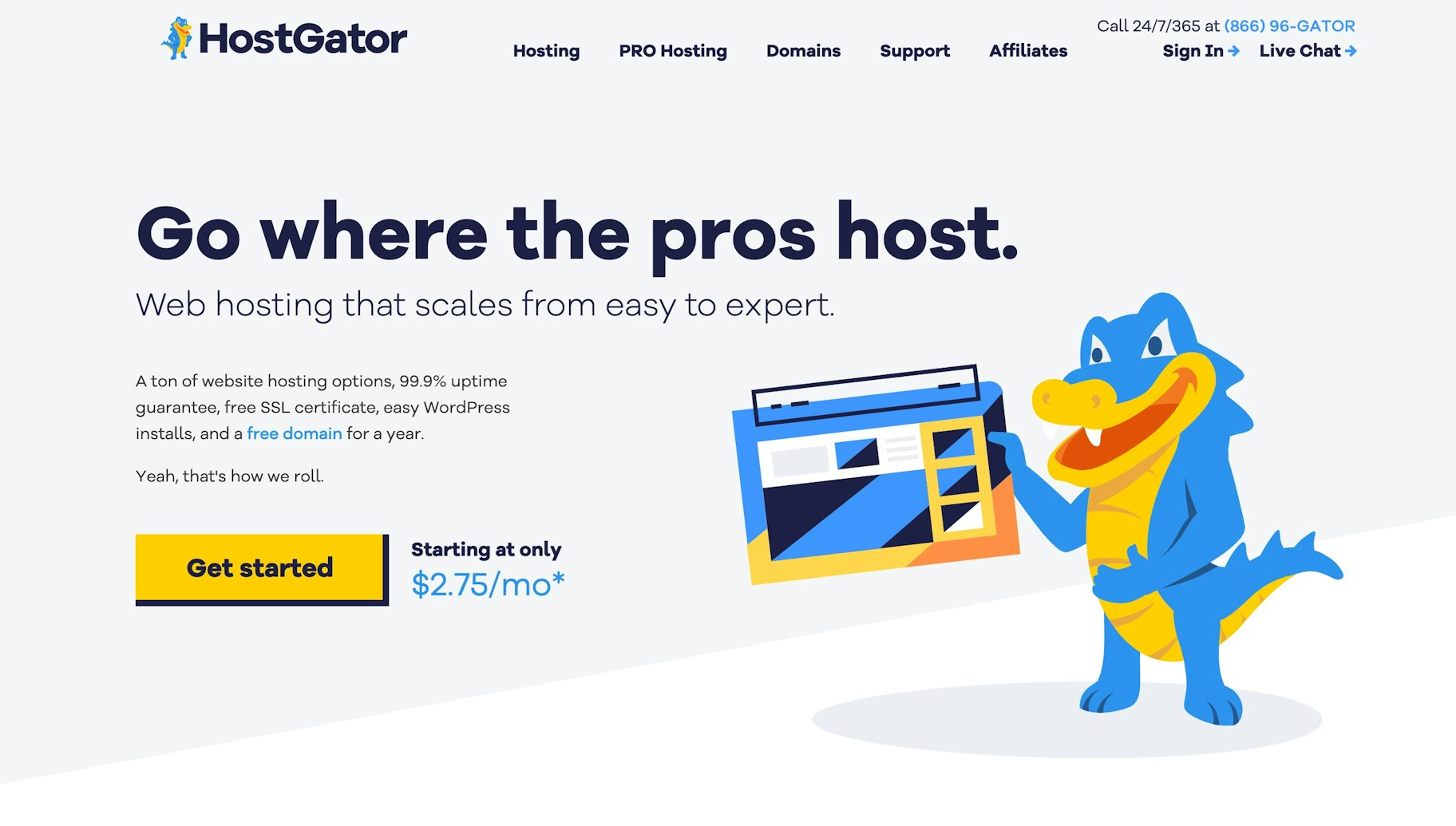
HostGator is another solid option to consider for your ecommerce hosting needs. It hosts more than two million websites and offers a range of features with its private VPS plans, including:
- 99.9% uptime guarantee
- Dedicated IP addresses
- Weekly off-site automatic backups
- Unlimited email accounts communications
- Round-the-clock support
Pricing: Starts from $19.95/month for private VPS plans.
How to choose an ecommerce web hosting service
After going through the list of the best ecommerce hosting providers, it’s time to pick one for your business. What should you focus on to ensure you’re making the best choice? Here are five key considerations to guide your decision:
Uptime
Uptime is a measure of how consistently a website is available online. It’s usually given as a percentage, showing the amount of time a site is up and accessible to users. High uptime means a website is reliable and rarely goes offline.
You want a hosting provider with an uptime as close to 100% as possible. This ensures your ecommerce store is almost always available to customers.
To check a host’s uptime record, use tools like Uptime and Pingdom. These services provide unbiased reports on hosting reliability, including any downtime incidents and the host’s response times to solve them.
Speed and bandwidth
Speed matters a lot for your website. If your site loads fast, people are more likely to buy from you. Even making your site just one second faster can boost sales on phones by up to 27%.
Speed also helps your site show up higher in Google searches. Google likes to recommend fast sites to its users.
Make sure your online store loads quickly. Check how much data your hosting can handle at once. This is called bandwidth.
If your site gets too busy and goes over the bandwidth limit, it can’t be reached by customers. You might need to pick a more expensive plan to keep up.
Choose hosts that offer unlimited bandwidth. This way, as your store gets more visitors, your site can handle it without slowing down.
Privacy and security
Ecommerce websites—like their standard counterparts—are prone to cyber attacks. These attacks can secretly modify your website’s data or monitor the information you transmit. A widespread attack is DDoS (distributed denial of service), where hackers flood your site with so much fake traffic that it stops functioning.
To protect your website, choose a hosting service that fights against these threats with:
- Malware scanning: This finds and removes harmful software.
- DDoS protection: It stops the fake traffic so your site stays up.
- Firewalls: These are like guards that only let safe traffic through.
It’s also worth mentioning that your personal information isn’t automatically private when you register a domain.
Using a WHOIS lookup, anyone can see details like who owns the domain, when it was registered, and when it expires. To keep your information out of public view, select a hosting provider that includes WHOIS protection. This service hides your personal details from the WHOIS database
Pricing
Pricing is another factor you should consider carefully. Many hosting packages initially seem affordable but may lack key features or have restrictions that could hinder the growth of your ecommerce site.
To avoid these pitfalls, consider getting hosting directly from your ecommerce platform. This option often includes all the necessary features for one monthly fee. For instance, Shopify offers hosting for $39 a month, bundling a domain name, unlimited bandwidth, inventory management, and PCI compliance.
Customer support
Hosting becomes trickier as your website gets busier. Choose a host that’s easy to talk to when you need help.
For urgent problems, talking on the phone or through live chat works well. But for smaller issues, you might prefer to send a quick message without waiting in line.
Note that there’s a noticeable difference between SaaS platforms and platforms you host yourself. The ones you host yourself might ask you to pay more if you want quicker support, which means the more you pay, the faster you get help.
Choosing the best ecommerce hosting provider

Good web hosting is crucial to ecommerce success. You need to host your site on servers that respond to your visitors’ requests fast. Meanwhile, the ecommerce host should have a strong track record in malware, hacking, and security protection.
Whether you’re searching for ecommerce hosting to launch a new online store or a reliable provider to accommodate your growing business, you can be sure to find something that caters to your business from these excellent web hosting options.
In summary, here’s a list of ecommerce hosting providers to consider in 2024:
- Shopify
- Bluehost
- IONOS
- Hostinger
- Siteground
- A2 Hosting
- Dreamhost
- GoDaddy
- InMotion hosting
- Hostgator
Note that none of these hosting providers offer an all-one-one ecommerce platform—except Shopify. This means you’ll first need to install ecommerce software, then create an online store using the features available. If you’d prefer to start from the store-building phase and bypass the technical aspects of running ecommerce software, Shopify is a perfect choice.
Best ecommerce hosting FAQ
What is an ecommerce server?
An ecommerce server is the computer equipment a hosting company uses to store all of your website’s information. When someone shops on your site, their browser gets the needed details from this server to show the page.
Do I need ecommerce hosting?
Yes, every online store requires ecommerce hosting. Your hosting provider transfers your website’s content—such as images, text, and code—to the visitor’s browser. Without a host, visitors would encounter a non-functioning website.
Which host is best for ecommerce?
Shopify is recommended for ecommerce hosting. It offers web hosting along with other necessary features for online stores, such as website templates, inventory management systems, and payment processing.






